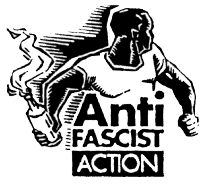“Counter-mobilization: A Strategy to Fight Racist and Fascist Attacks” is a
pamphlet published by the Socialist Workers Party (SWP) in the United States.
For some reason, Farrell Dobbs is credited as the author on the front page.
Actually, the bulk of the pamphlet consists of a discussion between several SWP
leaders and activists, Dobbs among them, about the best way to counter fascism.
I happen to know that the SWP's line on fascism is very controversial among anti-fascist activists (the SWP has a small group of co-thinkers in Sweden, the Communist League). In Sweden, as in most nations, the goal of left-wing radicals is to “clubber” the fascists (to use Dobbs' expression), or at the very least to stop their meetings or to disturb them as much as possible if they can't be stopped outright. The Communist League argued against this strategy, and therefore left anti-fascist protests before the “clubbering” began. By contrast, the RS, the most active far left group in Sweden 20 years ago, adapted politically and sometimes physically, to the club-wielding brigade. In addition, most leftists (but perhaps not the RS) have traditionally demanded that the state bans fascist and racist organizations. The Communist League opposed this, too. Finally, the SWP's co-thinkers argued that the small fascist groups active during the 1980's and 1990's were really irrelevant, *real* fascism being something else. When it finally comes, it will be savvy, slick, were business suits and enjoy widespread support from the establishment. In Sweden, they argued, fascism could even come in a “socialist” form, perhaps through a future nationalist split from the governing Social Democratic Party. (While this idea sounds farfetched, I consider it a distinct possibility, albeit in the long term.)
All these ideas come from this particular pamphlet, first published by the SWP in 1976. It deals mostly with anti-racist/anti-fascist organizing on campus. Today, many students at American universities support the outright suppression of free speech, either by the administration or by the student activists themselves. During the 1970's, the general feeling of the student body was the exact opposite. Students, including radical students, were so supportive of free speech that even non-confrontational protests against racists were controversial. Of course, there was also a minority of activists who did try to stop certain speakers from appearing on campus, usually Arthur Jensen, William Shockley and Richard Herrnstein. The backdrop to the discussion in “Counter-mobilization” is an attempt by some leftist groups to stop an otherwise unknown neo-Nazi from appearing before a speech class at San Francisco State University. The SWP's campus organization refused to participate in the action.
Dobbs, Jack Barnes and the other SWP cadres argue that one should not attempt to stop fascists and racists from appearing on campus. They even argue that they, alongside everyone else, should have free speech. Every piece of repressive legislation against fascists will be used by the state to repress workers, radicals and anti-fascists even more. Indeed, such a general climate of repression will simply embolden the supposedly “illegal” fascists, who usually have the sympathies of the police and other establishment figures. However, it's not the primary task of the progressive movement to “defend” the “right” of fascists to free speech. (Here, the SWP parts company with ACLU and other “professional civil libertarians”, as Dobbs calls them.) Rather, the labor movement and other progressives should primarily defend their own democratic rights, against both the fascists and the state. To this end, the SWP calls for counter-demonstrations against fascist meetings or racist speakers, not to stop them, but to educate the public about the fascist menace (and, I presume, to show that the progressive movement is larger).
The SWP leaders further argue that the fascist groups active during the 1960's and 1970's were relatively unimportant to begin with. In the future, fascists won't be obvious kooks, and will neither wear swastikas nor don peculiar white gowns. They will come with an attractive program which seemingly offers solutions to the struggling middle class, build a mass movement, and avoid any explicit references to fascism. Above all, future fascism will come through a section of the establishment. SWP leader Jack Barnes proposes that the next fascist mass movement will have a program similar to that of Lyndon LaRouche's NCLC. This is not a bad guess: many classical fascists pretended to be “socialists”, “leftists” or pro-labor.
The weakest part of “Counter-Mobilization” is when the SWP attempts to prove that Leon Trotsky and the early Trotskyist movement had the same positions on fascism as the SWP leadership in 1976. The SWP is a direct continuation of the American Trotskyist movement of the 1930's, Farrell Dobbs being involved almost from the start. However, I think it's obvious from the material printed in this volume, and from Dobbs' own anecdotes, that the SWP originally *did* want to clubber the fascists and stop their meetings. True, they didn't always explicitly say so, but that seems to have been a mere tactical move, similar to the insistence of the Bolsheviks in November 1917 that they were merely defending the soviets against attack, when in reality Lenin was master-minding a coup to overthrow the government. By contrast, SWP's position in 1976 doesn't seems to be a mere tactical ploy, but their actual strategy. The new look SWP also called for the National Guard to protect Blacks against racist mobs in Boston and elsewhere, a position I'm sure Trotsky would have condemned as “reformist”! There's a certain tension in this material between attempts to sound reasonable, and other attempts to sound more revolutionary and hardboiled. I almost get the impression that Dobbs acts as “the left alibi” to Barnes during the discussion…
That being said, “Counter-mobilization” is nevertheless a relatively interesting Education for Socialists pamphlet, and I therefore give it four stars.

No comments:
Post a Comment